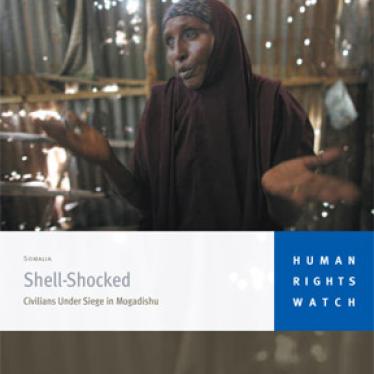(New York) - The Somali government’s systematic harassment of journalists, its closures of media outlets, and its failure to investigate the killing of eight journalists have deeply damaged independent reporting in Somalia, Human Rights Watch said today.
On October 19, two unknown gunmen shot at close range Bashir Nur Gedi, the acting manager of Shabelle Media radio, outside a cafe in Mogadishu. Gedi was the eighth journalist to have been killed in Somalia in 2007. In addition, almost a dozen journalists have been wounded, including during major fighting in Mogadishu, making this the most dangerous year ever for the Somali media.
“The violent attacks on Somalia’s journalists threaten their courageous reporting on the crisis in Mogadishu,” said Peter Takirambudde, Africa director of Human Rights Watch. “The transitional Somali government must condemn and investigate these attacks as well as cease its own harassment of the media.”
Since January, when the Ethiopian-backed Transitional Federal Government (TFG) established itself in Mogadishu, conflict has escalated between TFG and Ethiopian forces on one side and a coalition of insurgent groups on the other. This has resulted in the deaths of hundreds of civilians and displaced up to 400,000 people from the Somali capital. All sides have been responsible for numerous, serious abuses of civilians.
The growth of independent media and civil society – one of the few success stories in Somalia’s 17 years of violent, stateless warfare – has been severely damaged over the past 10 months. Somali journalists reporting on the crisis have come under increasing attack, including through targeted killings. The transitional Somali government has subjected many journalists to arbitrary arrest and detention, and repeatedly closed independent media outlets.
The perpetrators of most of the eight killings of individual journalists in 2007 remain unknown. To date, Somali government officials have consistently failed to condemn the killings, much less investigate, arrest, or prosecute anyone in connection with them.
On February 16, Ali Mohammed Omar, a journalist working for Warsan Radio, was shot in the head as he left the station’s Baidoa office. The killings on August 11 of Ali Iman Sharmarke and Mahad Ahmed Elmi – respectively the owner and a senior radio journalist at HornAfrik, one of the country’s most prominent media outlets – dealt a massive blow to independent journalism. Several prominent HornAfrik staff fled the country in the days after the murders. The recent killing of Shabelle Media’s Bashir Nur Gedi follows months of government attempts to close Shabelle.
Several journalists in Mogadishu say they believe they are being hunted by unknown men in civilian clothes armed with pistols. Some reporters have received anonymous death threats by telephone. One journalist working in Mogadishu told Human Rights Watch that on September 23 he was attacked by three men in central Mogadishu, and only survived because the pistol jammed repeatedly.
He and other Somali journalists describe a critical situation in Mogadishu, with media targeted by both the Somali government and insurgent forces. Although the identity of the attackers is often unclear, the threats and type of attack, which have included a remote explosive device in at least one case, suggest to some journalists that insurgent as well as government forces may be responsible for the killings.
“The government and the insurgent groups must stop threatening the media,” said Takirambudde.
Many journalists were wounded during the major military operations between Ethiopian and TFG forces against the insurgents in Mogadishu earlier this year. During intense fighting in April, at least three journalists working for HornAfrik were wounded when their radio station came under sustained Ethiopian shelling and rocket barrages.
TFG forces have repeatedly harassed and detained Somali journalists, particularly in connection with their reporting on events in Mogadishu. The TFG has on occasion asserted that the reporting incited violence. Human Rights Watch documented the detention of more than 40 Somali journalists this year. Although most of them were released within a few hours, others were held for long periods without charge.
On September 17, Somali government troops fired on Shabelle Media compound and briefly detained 16 of its staff members. The government alleged that a grenade was thrown from the building, which Shabelle vehemently denied. The following day, government troops laid siege to Shabelle radio again, closing the radio station for two weeks.
The armed attacks on Shabelle followed months of temporary closures of media outlets by TFG forces. In January 2007, the TFG tried to close down three local radio companies including the two most popular FM stations – HornAfrik and Shabelle – as well as the international broadcaster Al-Jazeera. On March 21, the TFG closed Al-Jazeera, this time permanently, claiming it was giving air time to terrorists. The Somali radio stations continued to transmit despite threats to their operations. In June, the TFG again ordered the closure of three local stations, HornAfrik, Shabelle, and Holy Koran Radio.
“Somali media are a critical forum for Somali debate and a key source of information on what is otherwise an almost invisible crisis,” said Takirambudde. “Ensuring independent media and freedom of expression is critical, not only at this volatile time, but for a more stable Somalia in the future.”






